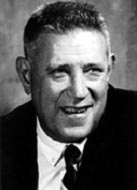- Jesse Stuart Elementary School
- Jesse Stuart
Jesse Stuart
-


"I am firm in my belief that a teacher lives on and on through his students. Good teaching is forever and the and the teacher is immortal." - Jesse Stuart
Jesse Stuart
Born: August 8, 1906
Died: February 17, 1984Jesse Hilton Stuart (August 8, 1906 - February 17, 1984) was an American writer who achieved prominence in the short story, poetry, and novels. Born and raised in Greenup County, Kentucky, Stuart relied heavily on the rural locale of Northeastern Kentucky (and, perhaps to some degree, Southwestern Ohio, mainly around the Portsmouth area) for his writings. Indeed, he said that most of his stories were elaborations of true incidents that he observed or had heard about.
Poetry
One day while he was plowing in the field, he stopped and wrote the first line of a sonnet: "I am a farmer singing at the plow." the first line of the seven hundred and three sonnets that he would collect in Man with a Bull-Tongue Plow (1934). The book was described by the Irish poet George William Russell (who wrote poetry under the name of AE) as the greatest work of poetry to come out of America since Walt Whitman published Leaves of Grass. Stuart was made poet laureate of the state of Kentucky in 1954, and in 1961 he received the award from American Academy of Poets.
Novels
His first novel was Trees of Heaven (1940). Set in rural Kentucky, the novel tells the story of Anse Bushman, who loves working the land and wants more land. Stuart's style is simple and sparse. Taps for Private Tussie (1943) is perhaps his most popular novel, selling more than a million copies in only two years. The novel also received critical claim and won the Thomas Jefferson Southern Award for the best Southern book of the year. In 1974, Gale Research (in American Fiction, 1900-1950) identified Jesse Stuart as one of the forty-four novelists in the first half of the twentieth century with high critical acclaim. Jesse Stuart was the second youngest of that group (William Saroyan was one year younger).
Short stories
Stuart published about 460 short stories. He wrote his first short story "Nest Egg" when he was a sophomore in high school in 1923. The story is of a rooster at his farm, whose behavior was so dominant that it began attracting hens from other farms, leading to conflict with the neighbors. Twenty years later, he submitted the story unchanged to the Atlantic Monthly, which accepted the story and published it in February of 1943; it was later collected in Tales from Plum Grove Hills.
One of his most anthologized stories is "Split Cherry Tree." In this story, a high school teacher in a one-room schoolhouse keeps a boy after school to work and pay for damage he did to a cherry tree. The boy's uneducated father comes to school to argue with the teacher, but comes to appreciate the value of education.
Education
Stuart has also been a prominent figure in American education, and the theme of education appears often in his books. He described the role that teaching played in his life in The Thread that Runs So True (1949), though he changed the names of places and people. He first taught school in rural Kentucky at the age of 19 at Cane Creek Elementary School, which became Lonesome Valley in his book.
He had only been teaching a few weeks when a husky student returned to school one day to beat him up. Stuart only weighed 150 pounds, and the student not only was bigger, but also had a reputation as a successful brawler. When Stuart defeated the boy in the fight, his reputation increased in the community. Events such as this led Stuart to a life long interest in improving the conditions of teaching.
The Thread that Runs So True (1949) has become a classic of American education. Ruel Foster noted in 1968 that the book had good sales in its first year. At the time she wrote, sales for the book had gone up in each successive year, an astonishing feat for any book. The book has continued continuously in print for more than fifty years.
Books by Jesse Stuart
Poetry
Man with a Bull-Tongue Plow (1934)
Album of Destiny (1944)
Kentucky is My Land (1952)
Hold April (1962)
Autobiographical
Beyond Dark Hills (1938)
The Thread that Runs So True (1949)
The Year of My Rebirth (1956)
To Teach, To Love (1970)
My World (1975)
Novels
Trees of Heaven (1940)
Taps for Private Tussie (1943)
Hie to the Hunters (1950)
Mr. Gallion's School (1967)
The Land Beyond the River (1973)
For Young Readers
The Beatinest Boy (1953)
A Penny's Worth of Character (1954)
Red Mule (1955)
Old Ben (1970)
Collection of Short Stories
Head o' W-Hollow (1936)
Men of the Mountains (1941)
Tales from the Plum Grove Hills (1946)
Plowshares in Heaven (1958)
Save Every Lamb (1954)
Come Gentle Spring (1969)
A Jesse Stuart Harvest (1965)
My Land Has a Voice (1966)
Come Back to the Farm (1971)
Books about Jesse Stuart
Jesse Stuart: His Life and Works, by Everetta Love Blair (University of South Carolina Press, 1967)
Jesse Stuart, by Ruel E. Foster (Twayne, 1968)
Jesse: The Biography of an American Writer, Jesse Hilton Stuart, by H. Edward Richardson (McGraw-Hill, 1984)
Jesse Stuart Links
(Content on this page provided by Wikipedia, the free encyclopedia)

